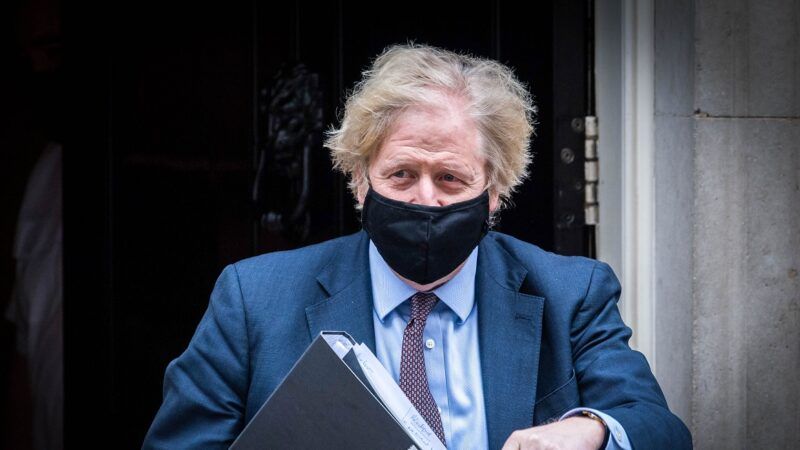How Britain Lost the Lockdown Battle
Even though COVID-19 spread is low, Brits love their lockdown.

March 23 marks the anniversary of Britain's lockdown. It's not that memorable a milestone, admittedly, as it's hardly the only country in that position. But the U.K. has one big difference from most countries, not least the United States: We're still in a strict lockdown.
This often goes underappreciated on the American side of the pond. Many point to indoor dining bans and the like in the U.S. as evidence that lockdowns endure on both sides of the Atlantic. But as irritating as those laws might be, they're not the same as the U.K. lockdown.
Since the beginning of January, the U.K. has had the real deal (just as we did for all of last spring and winter): an indefinite stay-at-home order coupled with on-the-spot fines for anyone going outdoors without good reason or visiting a family member. Bars, gyms, churches, and "non-essential" retailers (the majority of which were already shut thanks to the "local" lockdowns that engulfed much of England last winter) have all been closed for months.
Eleven weeks in and we've seen only the most minor relaxations. Since March 8, it's been permitted for two people to meet outside for a coffee—provided it's in a public space. From March 29, this limit will be extended to six people, and to private gardens. Meeting indoors will remain illegal until the middle of May.
The enduring lockdown is quite surprising. Goodness knows that if you'd said this time last year the U.K. would still be in lockdown—and all under "freedom-loving" Prime Minister Boris Johnson—you'd have been laughed out of town. That's before you factor in the vaccines, of which some 50 percent of U.K. adults (and virtually all seniors) have now received at least one dose.
Yet here we are: 12 months into restrictions and our once-cherished approach to liberty has been totally inverted. Lockdown, once a temporary aberration, has instead become the default. The burden of proof is placed on those arguing for freedom, rather than those wanting to remain in lockdown.
What went wrong? One ongoing, and unexpected, factor has been the astounding popularity of lockdowns. Ever since spring 2020, opinion polling has shown previously unthinkable majorities in favor of restrictions. Last month, for example, 72 percent of those asked backed the idea of a 10-day hotel quarantine for all international arrivals. Meanwhile, 59 percent of Brits want a ban on all protests and demonstrations during the pandemic.
It's no secret that the Boris Johnson administration is even more preoccupied with polling than its predecessors. Sometimes he appears reluctant to speak on an issue before consulting the polls. Witness his slowness last summer, for example, to speak out on the issue of whether anti-racism protesters were right to target a statue of Winston Churchill, a question that should have been an open goal for any Conservative Party prime minister.
But why do Brits back lockdown in the first place? The U.K.'s heightened fear of the virus plays a big role, as does the affinity for our National Health Service (which did, it's true, come under serious strain in January). That some of our doom-mongering modelers are already catastrophizing about a deadly "third wave" this summer doesn't help either.
Much of the country remains scarred by what many regard as a botched opening up last summer, when the government finally decided to reopen hospitality (albeit with strict physical distancing) after three and a half months of total closure. It was a decision that, at the time, was largely cheered by the British press. But nine months on from what the papers dubbed "super Saturday" and the reopening is being held up as the moment at which Britain began its headfirst march into a deadly second wave.
It's an argument that ignores the fact that, at the time of reopening, COVID-19 cases had plunged to miniscule levels in Britain; a level at which they remained all summer. Never mind, too, that the U.K.'s services-led economy had slumped by a record 20 percent at this point, and that human vaccine trials were still in their earliest stages. What was the alternative? Staying shut indefinitely?
None of this, unfortunately, has stopped this argument from catching on with a public whose approach to reopening now resembles that old Chinese proverb about the man bitten by a snake being scared of rope. In fact, more than a quarter of Britons say the current reopening plan—stores in April; bars with masks in May; freedom in June—is too quick, even with mass vaccination having driven down our case levels to the second lowest in Europe.
It's all a far cry from January, when our health secretary promised to "cry freedom" once the over-50s were vaccinated and, by extension, 95 percent of deaths eliminated. Instead, the goal posts have shifted, with the new line being that even a small rise in cases might lead to a rogue vaccine-resistant strain.
In some ways, the U.K. has been a victim of its own vaccine success. The expedited timeline of the rollout, well beyond original expectations, now means that we should have jabbed all willing adults by June. But rather than enabling the reopening of society, our vaccine success has crystallized a different proposition: What's another few weeks of house arrest if it removes that final scintilla of risk?
Like many lockdown critics, I have dozens of answers to that question. But it's too late: The battle is lost, and thanks largely to a half-truth. They told us vaccines would be our ticket to freedom—they didn't tell us we'd be taking the slow train.


Show Comments (30)